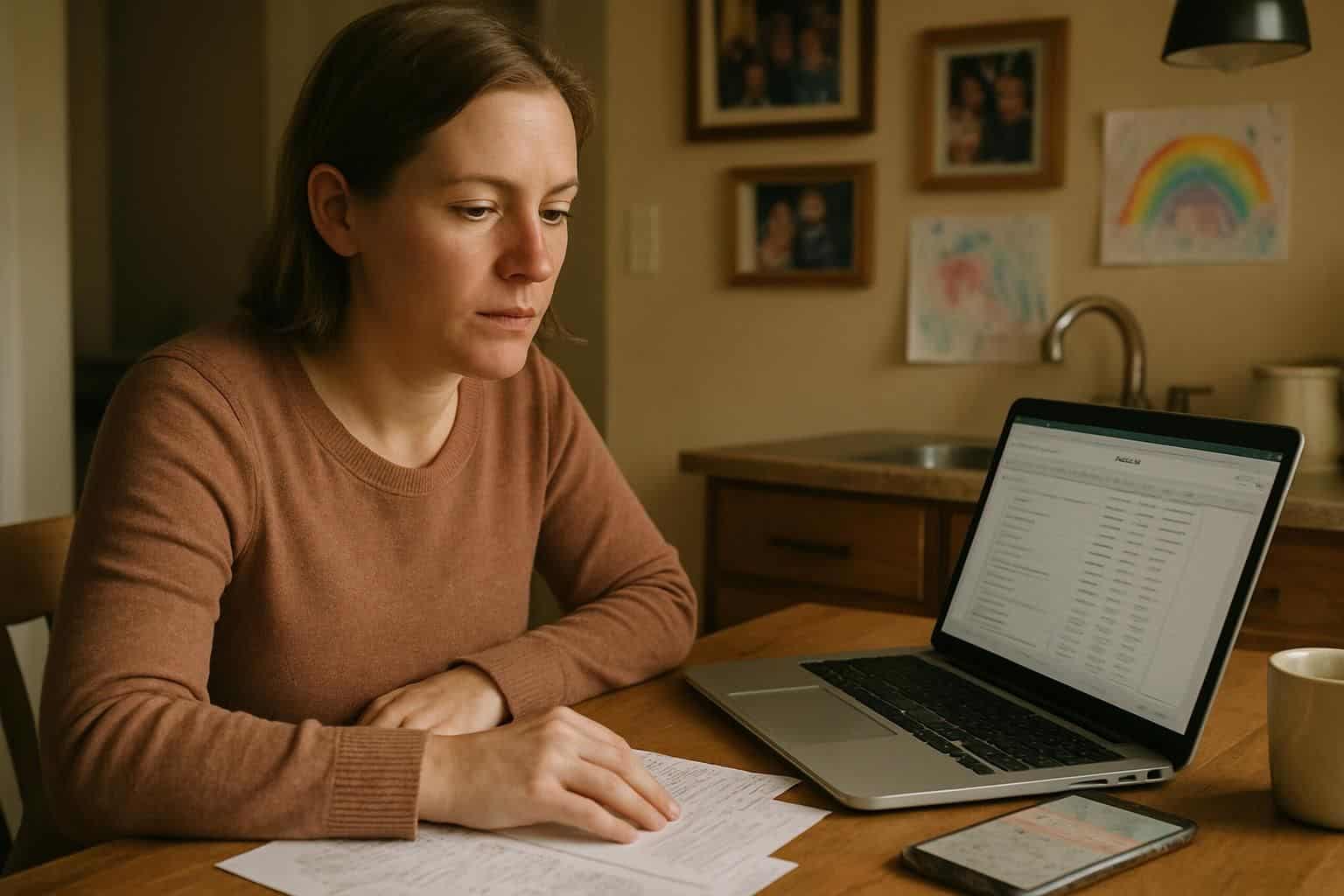Facing single mom challenges can feel lonely and exhausting. Single mothers often earn less salary, face stigma, and juggle childcare alone. This article gives practical tips on budgeting, emotional well-being, and building resilience to help you thrive in 2025.
Read more for simple ways to feel stronger and happier as a single parent.
Key Takeaways
Single moms often face tough money challenges, earning an average yearly income of about $26,000—with roughly 40% falling below the poverty line. In Utah, many single mothers have less than one month’s savings available, making finances a constant struggle.
Emotional exhaustion is another common struggle among single mothers, who score an average of 2.98 on mental distress scales. They typically put their own needs last, juggling all parenting responsibilities alone, which can lead to isolation, anxiety, and depression.
Budgeting can ease financial stress and stretch resources. Try creating a straightforward monthly budget, aiming to set aside enough emergency savings to cover three months of living expenses, and trimming down unnecessary spending. Free budgeting apps, online tools, and nonprofit financial counseling services can offer extra help.
Valuable community services—like local food pantries, utility bill help, and no-cost childcare programs—can make difficult times more manageable. Government support programs including SNAP (food stamps), TANF (temporary cash assistance), and Medicaid also provide essential resources for single moms facing financial struggles.
Taking care of yourself is necessary to stay healthy as a single mom. Committing even 15 minutes daily to personal relaxation, regular exercise, getting enough sleep, and setting clear personal boundaries can make a big difference and fight burnout. By 2025, greater remote work opportunities and new digital tools may further ease many challenges single parents face today.
Table of Contents
Common Challenges Faced by Single Moms

Single moms face tough hurdles that can drain both wallet and spirit. Money stress hits hard when one income must cover rent, food, and child care costs, while the daily grind can lead to deep tiredness and feelings of being alone.
Financial Strain

Money issues hit single moms especially hard. On average, they earn only about $26,000 each year, often barely covering basic family needs. Nearly 40% of single-mother households fall below the poverty level, making everyday bills incredibly stressful.
Low education levels often lock these mothers into lower-paying jobs, creating a never-ending cycle of financial strain. This tough situation forces them into painful financial choices—paying rent, buying groceries, or getting medicine for a child who is sick.
Thankfully, lots of community resources offer helpful financial support. Food banks and Individual Development Accounts (IDAs) give single moms crucial assistance in tough times. In Utah alone, 75% of single mothers could not survive financially for even one month without income.
For 35%, their money would run dry within just one week. Budgeting and financial planning skills become essential, given that 1 in 8 families across the United States are headed by single mothers.
Learning about solo parenting resources can also help connect moms with programs offering better job opportunities and affordable childcare.
Emotional Burnout
Emotional burnout often hits single moms especially hard—they juggle work, household chores, and parenting without help. Research shows single mothers score around 2.98 on mental health distress scales, indicating heavy stress levels.
Many feel trapped in endless exhaustion cycles, yet stopping isn’t possible because their kids depend on them. This ongoing burnout leads to low self-esteem and shame, especially if they can’t perfectly handle each task.
Being solely responsible for every parenting decision adds a huge mental burden most people can’t fully understand.
Single motherhood also creates unique emotional challenges, like feeling isolated even though they’re around children all day. Lack of adult interactions and shared parenting duties can cause deep loneliness and negatively impact mental health.
Moms frequently prioritize their kids’ needs, often ignoring the importance of self care as a mom. Over time, ignoring their own needs worsens burnout.
Most single moms have difficulty making time for basic self-care activities while still managing daily family demands. The guilt they experience about taking personal time strongly connects to increased depression and anxiety.
Social Stigma
Single moms often deal with harsh social judgment. Media frequently portrays them as incomplete or needy, adding unfair burdens to their daily lives. This negative image encourages stereotypes that overlook the courage and strength most single mothers demonstrate daily.
Many single parents feel judged at school meetings, workplace gatherings, or even around relatives.
The greatest weapon against stigma is living proudly in your truth.
Social pressures sometimes lead single moms into isolation, harming their mental health. Research shows parental guilt connects directly to negative health effects—stigma becomes much more than a temporary emotional weight.
Single mothers from Hispanic backgrounds face extra hurdles due to traditional family expectations. Practicing gratitude regularly and finding mentoring programs often help single moms resist these harmful perceptions.
Happiness frequently begins by ignoring outside judgment and confidently valuing your own parenting choices.
Strategies for Overcoming Financial Challenges

Money challenges hit single moms hard, but smart planning can turn the tide. Creating a clear budget helps you stretch your living wage while finding local aid programs can fill gaps when basic necessities seem out of reach.
Budgeting and Financial Planning
Smart financial decisions can give single moms independence and peace of mind during tough times. Managing money wisely can help you cover basic needs and keep your family financially secure. Here’s how to make it happen:
- Set up a simple monthly budget that clearly records your income and spending. Write down all money earned from jobs, child support, or benefits, then subtract costs like rent, groceries, childcare, and utilities.
- Create an emergency fund equal to three months of your living costs. Start by putting aside about $25 each week until you have enough saved for unexpected expenses—like medical charges, car issues, or sudden home repairs.
- Reduce unnecessary costs to make your paycheck last longer. Carefully review your bills for any subscriptions or services you rarely use, and consider free entertainment instead of paid options like streaming services or cable.
- Pay down debt with a clear, easy-to-follow strategy. First, focus on paying extra toward high-interest debts, while still keeping up regular payments on lower-rate balances.
- Connect with local organizations that support low-income single parents. Food assistance programs, affordable housing services, subsidized childcare, and low-cost healthcare options are all common resources to help you cope efficiently.
- Take advantage of free financial apps to easily track your money and spot areas where you can save extra cash. Simple budgeting software can help you prevent overspending and give you clear financial insight.
- Get advice from financial counselors who focus on single-parent families. Nonprofit groups often provide free financial planning assistance, helping you develop an achievable action plan suited to your personal needs.
- Each month, check your budget carefully and update it as things change. Regular reviews let you quickly adjust to any ups or downs in your income and spending.
Managing money effectively reduces worry, helping you better focus on yourself and your kids.
Seeking Community Resources
Careful budgeting helps a lot, but tapping into local resources makes your money stretch even further. For single moms facing challenges, community support is vital. Food banks provide groceries at no charge, leaving extra cash for other essentials.
Cities often have programs to cover rent or utility bills when finances get tight. These resources were lifesavers for me, raising children alone, while close to the poverty line.
Local community centers frequently offer low-cost or free childcare—giving you time to work or attend job training. Libraries host kid-friendly activities for free and provide internet access to help you find employment opportunities.
Church groups and local charitable organizations sometimes offer babysitting during meetings. These gatherings connect you with other single mothers, improving your mental health, while you exchange practical self-care strategies.
The strength of a single mother comes not just from within, but from the community that rises to support her journey.
Local organizations often have workshops tailored specifically for single-parent families, teaching employment skills and parenting techniques. Online forums can connect you with other moms who share similar backgrounds—including Hispanic heritage—to build virtual support circles.
The government also provides valuable programs like SNAP, TANF, and Medicaid to prevent severe hardship for families. Checking your eligibility for these programs can genuinely improve your daily circumstances as you become ready to be a single mother.
Managing Emotional Well-being

Single moms face huge stress that can drain their mental energy fast. A solid support system helps moms handle daily pressures and creates space for personal growth.
Building a Support Network
Moms need friends who truly understand their experiences. The Frolo app helps single parents connect easily with others facing similar daily struggles. Joining local groups gave me emotional support, along with practical childcare help at crucial times.
Mental health improves quickly when you have others around to share both laughter and tears. Many Hispanic moms in my own group say cultural connections help them make parenting choices easier, relying on shared wisdom.
Having a strong community around you can lighten parenting responsibilities. Nearby organizations often offer useful resources—like meal preparation, rides, and after-school care—to ease pressures related to raising kids.
My own support network began small, with just two other moms. Now we regularly swap weekend childcare duties, giving each other much-needed breaks. These relationships help ease common hardships faced daily by single parents.
Self-care feels achievable when you have friends ready to help during difficult moments.
Prioritizing Self-Care
Taking care of yourself as a single mom isn’t optional—it’s essential for your strength and emotional balance. How you feel mentally directly shapes your parenting choices and your ability to tackle daily hurdles.
- Make a daily “me time” appointment, even just 15 minutes, to unwind with tea, a quick bath, or some reading—the short break helps clear the stress of child-raising.
- Keep your body active with short walks, yoga sessions, or fun activities like mother daughter fitness. Staying physically active lifts your mood and gives extra energy to handle routine tasks.
- Prioritize your sleep by setting up a relaxing bedtime routine—good rest keeps your mind sharp and helps prevent exhaustion.
- Stay connected socially through quick phone chats, coffee meet-ups, or online groups aimed at single parents. Social ties help fight isolation, common among single mothers, including those in Hispanic communities.
- Set boundaries by politely declining extra work that drains your energy without benefiting you. Healthy limits preserve your mental strength and valuable time.
- Choose nutritious foods instead of quick fixes—good eating habits support brain power and help prevent health issues in the long run.
- Treat yourself to small, inexpensive pleasures like a home facial or watching your favorite TV show. Affordable joys count, and they’re budget-friendly too.
- Tap into community programs available for single parents—many offer practical help like free childcare, groceries, or counseling services at low or zero costs.
- Turn to quick stress-relief techniques like deep breathing or five-minute meditations during tough times. These simple tools quickly calm your mind.
- Record little victories in your journal or phone notes—tracking achievements boosts your confidence and reminds you of daily progress.
Here’s what life for single moms could look like in 2025.
How Will the Challenges and Opportunities for Single Moms Evolve in 2025?

Single moms will meet new parenting challenges in 2025—but they’ll see new possibilities too. Remote work will become even more common, letting moms arrange their workday around kids’ needs.
This flexibility can ease financial pressure, leaving extra hours to spend at home together. Helpful digital apps for tasks like budget tracking, meal organizing, and homework assistance will also be easier to find and use.
Such resources lighten daily chores that often trigger stress or worry—especially for busy parents from Hispanic and other diverse backgrounds.
Government support programs may grow further, focusing on the unique difficulties faced by single-parent families. Schools might extend their open hours and increase support offerings, easing stress for moms making daily parenting choices alone.
Online community groups will strengthen as moms connect across locations, sharing similar struggles and practical advice. At the same time, shifting social views will continue to erase outdated judgments about single motherhood, with more single moms visible in media and everyday public life.
The growing focus on mental wellness and work-home balance will lead to practical resources and broader acceptance for single moms in the years ahead.
People Also Ask
What are the biggest challenges single moms face with parenting decisions?
Single mothers face tough parenting choices alone, without a partner’s support. They juggle work responsibilities, household chores, and childcare—all on their own. Balancing these daily demands often creates stress, impacting their emotional health.
How can single mothers avoid feelings of deprivation while raising children?
Concentrate on what you can give your kids rather than what’s out of reach. Spending quality time together matters much more than expensive toys or gadgets. Fun doesn’t require money—try free activities like visiting parks, libraries, or community events.
Do single moms from Hispanic origin face unique challenges?
Yes, Hispanic single mothers often deal with added cultural pressures regarding family roles. They must balance traditional family expectations alongside modern parenting responsibilities. Many also experience language barriers or pressures from their communities, making their situations even harder.
What steps can single moms take to protect their mental well-being?
Make time each day—even if it’s just 15 minutes—for yourself to relax and recharge. Talk openly with other parents who share your experiences to build supportive relationships. Taking care of yourself is a key part of providing your kids a happy, stable home life.
References
https://pmc.ncbi.nlm.nih.gov/articles/PMC11231931/
https://www.linkedin.com/pulse/how-manage-parenting-challenges-single-mom-2025-eizge
https://www.linkedin.com/pulse/how-manage-finances-single-mom-2025-single-mother-grants-rzg3f
https://supportforsingleparents.org/building-a-support-network-as-a-single-parent/
https://parents-together.org/5-tips-for-building-your-parenting-village-as-a-single-parent/ (2021-10-21)
https://www.linkedin.com/pulse/how-tackle-your-biggest-struggles-single-mom-2025-z9nfe
https://www.singlemothersurvivalguide.com/how-to-make-the-most-out-of-2025-a-guide-for-single-mums/ (2025-02-20)
